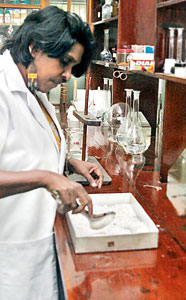Many years ago when children failed to study or committed stupid and foolish acts, mothers used to say "Gonaa, moota dennda oone punnakku, neththang moowa heduwata wadaa hondai punnakku deela Uurekuwa heduwanang! (Cow, you should be fed with Poonac or it would be rather better to rear a pig fed with poonac).
In the same wave length if someone tells you "Thammuseta Polkudu Kawannda oone ooy" (You should be forced to eat coconut waste) what would be your reaction? Very soon however we’ll all, especially those susceptible to heart ailments, be prescribed or encouraged to eat 'Polkudu' or drugs made with 'Coconut Galactomannan' (in Polkudu there is 23% of Galactomannon – dietary fibre).
 |
| Dr.Janaki Goonaratne in her lab checking ‘Polkudu’ |
This would be soon possible thanks to the results of an extensive and rare kind of research - for the first time in the world - by Dr (Ms) Janaki Gooneratne, Head, Food Technology at the Industrial Technology Institute (ITI).
On an earlier occasion, Dr Gooneratne was featured in the Business Times of January 16 showing her achievement on the breakthrough in the bitterness in lime.
There have been sporadic attempts to discredit and undermine the value of coconut. In a recent interview, the food scientist said that there is little or no research conducted on the scale of which she has conducted, on the valuable properties and specially its medicinal values, though there are countries which use coconut extensively.
Dr Gooneratne said that she has a particular interest on the subject matter as she has done her PhD on dietary fibre-related work and afterwards she worked hard with regard to active components in fibre. In Sri Lanka coconut is only second to rice as a food. She has used her expertise to assess the actual properties of coconut where heart ailments are concerned and especially its effect on the much talked about "Cholesterol" where if she could establish the medicinal value of coconut and that of coconut waste (Polkudu), it would be of great value to Sri Lanka.
This would create awareness of the value of coconut and also could bring down the prices as with 'Polkudu' being used, after removing the fat, then there would be less coconut used.
On the same lines she has also conducted successful research on banana and passion fruit peels as food waste.
As her involvement has been on food technology she has also been keen in the use of fruit and vegetable waste.
She said that earlier, consumption of coconut fat containing high amounts of saturated fats has been put forward as a hypothesis to explain the high incidence of Cardiovascular Diseases (CVD) in Sri Lanka. Coconut is a major source of dietary fat contributing about 29% of total energy requirement and 80% fat from habitual diets. She said that among adults CVD is the leading cause of deaths in Sri Lanka.
The scientist’s subsequent work shows that increase in plasma cholesterol corresponded with increases in both LDL and HDL cholesterol concentrations.
Experimental and metabolic studies suggest that coconut consumption can cause hyperlipidemia and atherosclerosis. However Dr Gooneratne said that according to research hyperlipidemia and heart diseases are uncommon among high coconut consuming populations.
She said that despite the long-standing interest in the diet-heart hypothesis, a number of studies that directly address associations between coconut fat intake in habitual diets and risk of CHD (Cardiovascular Disease) are surprisingly small. Cross populations studies have shown positive association between saturated fat intake and risk of CHD. But interpretation of these results within different cultural settings is complicated.
Before undertaking the study and research on the medicinal effects on coconut, Dr Goonaratne has carried out an extensive research to establish whether there is a relationship in the consumption of coconut and coconut oil with cholesterol, in the Gampaha District - an area coming under the Coconut Triangle adopting a random sampling on a target group of 957 (male and female).
A group of 957 volunteers (males 340, females 617) aged 18 and 65 years were enlisted for the research and all the factors such as socio-demographic data, family history of disease and lifestyle were assessed. Anthropometry and arterial blood pressure were measured, lipid profiles were determined. The nutrient intake was measured by 3-day dietary records and they were grouped as high fat and low fat.
Associations between selected CVD risk factors and Coconut Fat (CF) intake were investigated using Chi-square test and further examined in a multivariate model adjusting for potential confounding variables. Data was analyzed using SPSS statistical software. This extensive research results concluded that consumption of CF at 16.4% of total energy per day had no CVD risk on the study population.
While the researchers are confident that the application of the experimented substance on human beings would be successful, but yet to be applied on human beings, which would involve a tedious process, Dr Gooneratne assured that this process could be completed within a period of six months to two years. She is certain that 'Polkudu' that has indeed gone waste would stand tall in the world medicinal market.
She has been ably assisted in her research work by Dr Chandrasiri Piyasena of the Medical Research Institute, Prof K Samarasinghe and Dr Janak Widanaarachchi of the Department of Animal Science, Faculty of Agriculture, Peradeniya University. |


